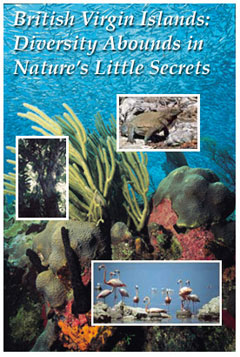 |
.
British Virgin Islands:
Diverity Abounds in Nature's Little Secrets
An archipelago of 60 islands and cays, BVI is located 60 miles east of Puerto Rico and has a population of 19,842 people. Established in 1961, the National Parks Trust of the Virgin Islands (formerly the British Virgin Islands National Parks Trust) is a non-profit, statutory body, which manages national parks and designated marine and terrestrial protected areas. The Trust also administers several environmental programmes including marine conservation and biodiversity conservation programmes.
The part of government directly concerned with conservation is the Department of Environment and Fisheries Department. BVI has environmental legislation for the protection of the territory’s natural resources, the most recent of which is the Fisheries Act of 1997 which regulates fisheries activities throughout the islands. The Territory is a signatory to several international environmental agreements such as the Convention of Biological Diversity, the Convention of International Trade of Endangered Species (CITES) and the “Ramsar” Convention on Wetlands among others.
Full enforcement of legislation is hindered by the lack of adequate facilities and manpower. Development of marinas along the coastal areas has been an on-going issue in the territory. Mangroves and sea grass beds are destroyed and reefs are smothered to make way for the tourism-related infrastructure as development continues to compete with the environment on which it is based.
At 8km² Jost Van Dyke is the smallest of the four main islands, and is towards the western end of the archipelago. Jost van Dyke and its sister islands are very diverse. Together, the islands host approximately 200 native and naturalized plant species. The Jost Van Dyke Preservation Society was established in 2004 for “the preservation of the history, cultural, land and marine environment, and heritage of Jost Van Dyke as an example of the environmental, social and cultural evolution of small islands in the Caribbean.”
about Virtual Tours...
|
 |
|












